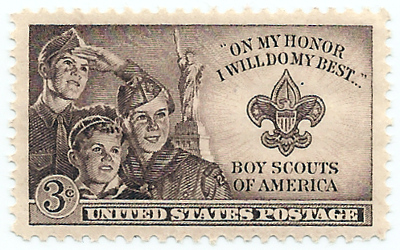| The requirements to this merit badge are copyrighted by the Boy Scouts of America. They are reproduced in part here under fair use as a resource for Scouts and Scouters to use in the earning and teaching of merit badges. The requirements published by the Boy Scouts of America should always be used over the list here. If in doubt about the accuracy of a requirement, consult your Merit Badge Counselor. |
|---|
| Reading this page does not satisfy any requirement for any merit badge. Per National regulations, the only person who may sign off on requirements is a Merit Badge Counselor, duly registered and authorized by the local Council. To obtain a list of registered Merit Badge Counselors, or to begin a Merit Badge, please contact your Scoutmaster or Council Service Center. |

Requirement 1
editDo the following:
- A. Discuss how you can better understand people, places, institutions, history, and geography as a result of collecting stamps.
- B. Briefly describe some aspects of the history, growth, and development of the United States postal system. Tell how it is different from postal systems in other countries.
Requirement 2
editDefine topical stamp collecting. Name and describe three other types of stamp collections.
Requirement 3
editShow at least ONE example of each of the following:
- A. Perforated and imperforate stamps
- B. Mint and used stamps
- C. Sheet, booklet, and coil stamps
- D. Numbers on plate block, booklet, or coil, or marginal markings
- E. Overprint and surcharge
- F. Metered mail
- G. Definitive, commemorative, semipostal, and airmail stamps
- H. Cancellation and postmark
- I. First day cover
- J. Postal stationery (aerogramme, stamped envelope, and postal card)
Requirement 4
editDo the following:
- A. Demonstrate the use of ONE standard catalog for several different stamp issues. Explain why catalog value can vary from the corresponding purchase price.
- B. Explain the meaning of the term condition as used to describe a stamp. Show examples that illustrate the different factors that affect a stamp's value.
Requirement 5
editDemonstrate the use of at least THREE of the following stamp collector's tools:
- A. Stamp tongs
- B. Water and tray
- C. Magnifiers
- D. Hinges and stamp mounts
- E. Perforation gauge
- F. Glassine envelopes and cover sleeves
- G. Watermark fluid
Requirement 6
editDo the following:
- A. Show a stamp album and how to mount stamps with or without hinges. Show at least ONE page that displays several stamps.
- B. Discuss at least THREE ways you can help to preserve stamps, covers, and albums in first-class condition.
Requirement 7
editDo at least TWO of the following:
- A. Design a stamp, cancellation, or cachet.
- B. Visit a post office, stamp club, or stamp show with an experienced collector. Explain what you saw and learned.
- C. Write a review of an interesting article from a stamp newspaper, magazine, book, or Web site (with your parent's permission).
- D. Research and report on a famous stamp-related personality or the history behind a particular stamp.
- D. Describe the steps taken to produce a stamp. Include the methods of printing, types of paper, perforation styles, and how they are gummed.
- F. Prepare a two- to three-page display involving stamps. Using ingenuity, as well as clippings, drawings, etc., tell a story about the stamps and how they relate to history, geography, or a favorite topic of yours.
Requirement 8
editMount and show, in a purchased or homemade album, ONE of the following:
- A. A collection of 250 or more different stamps from at least 15 countries.
- B. A collection of a stamp from each of 50 different countries, mounted on maps to show the location of each.
- C. A collection of 100 or more different stamps from either one country or a group of closely related countries.
- D. A collection of 75 or more different stamps on a single topic. (Some interesting topics are Scouting, birds, insects, the Olympics, sports, flowers, animals, ships, holidays, trains, famous people, space, and medicine). Stamps may be from different countries.
- E. A collection of postal items discovered in your mail by monitoring it over a period of 30 days. Include at least five different types listed in requirement 3.
External Links
edit- Stamp Collecting Merit Badge with current requirements workbook PDF.
- Stamp Collecting Merit Badge Requirements and resources PDF.
- Introduction to Stamp Collecting from the Postal Museum
- History of the US Postal Service
| Earning Merit Badges in the Boy Scouts of America |
|---|
| Indoor Hobbies and Arts and Crafts |
| Art | Basketry | Bugling | Coin Collecting | Collections | Cooking | Dog Care | Fingerprinting | Genealogy | Indian Lore | Leatherwork | Model Design and Building | Moviemaking | Music | Painting | Pets | Photography | Pottery | Programming | Radio | Railroading | Reading | Sculpture | Stamp Collecting | Theater | Wood Carving | Woodwork |